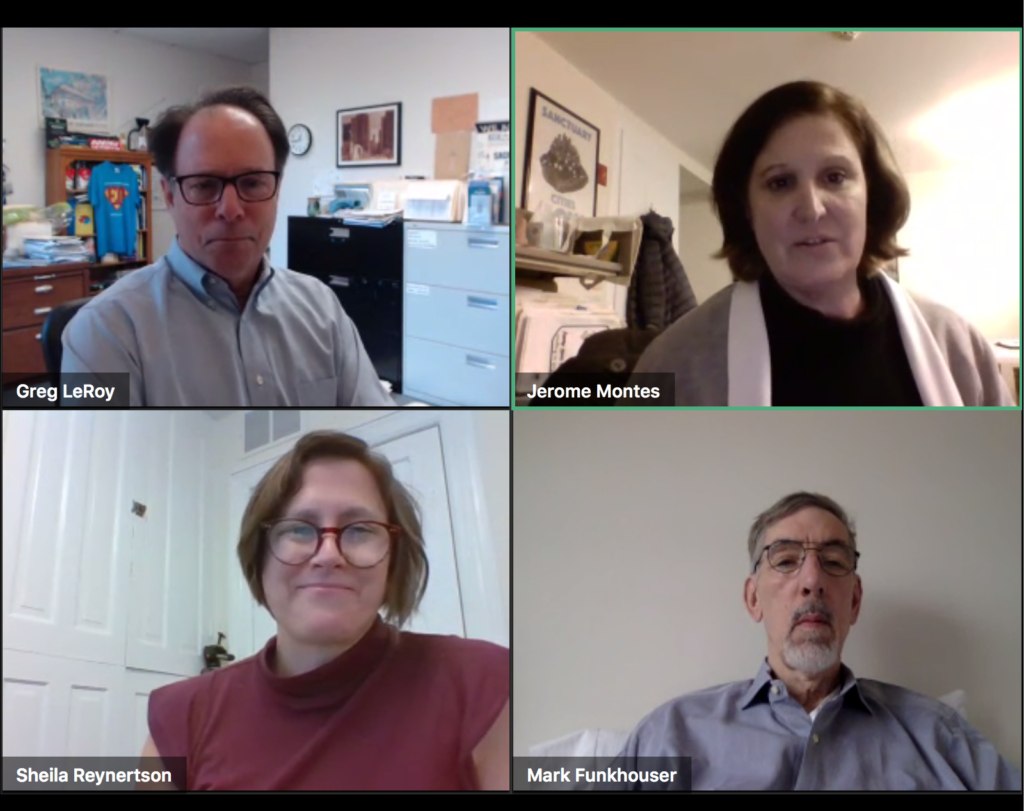
TRENTON, NJ (November 18, 2019) – New Jersey’s large-scale corporate tax breaks are costly and ineffective at promoting economic development, according to state and national policy experts who joined New Jersey Policy Perspective (NJPP) on a video call Monday afternoon.
Convened during a break in the State Senate’s Select Committee on Economic Growth Strategies hearing, the NJPP webinar examined the questionable benefits of corporate subsidies and recommended New Jersey rein in and reform its economic development programs with better targeting and hard caps on awards.
“New Jersey simply cannot afford to give out endless corporate tax subsidies, regardless of what beneficiaries of the tax breaks say,” said Sheila Reynertson, NJPP’s senior policy analyst. “National experts agree that this is a misguided approach to economic development with little return on investment for workers, local communities, or taxpayers. State lawmakers must heed the advice of impartial policy experts calling for reforms.”
According to Mark Funkhouser, the former auditor and Mayor of Kansas City, corporate tax subsidies almost never break even for taxpayers, especially when the awards are as high as those given out by New Jersey’s Economic Development Authority. After the passage of the Economic Opportunity Act of 2013, the state’s corporate subsidy awards often exceeded $100,000 per job created or retained.
“The evidence is overwhelming that using tax incentives to “buy” jobs doesn’t work,” said former Kansas City Mayor Mark Funkhouser. “It didn’t work in Kansas City and it hasn’t worked in New Jersey. Every dollar diverted to the corporate coffers is a dollar that could have been used to support a better quality of life for New Jersey residents.”
Mark Funkhouser served as Mayor of Kansas City, Missouri from 2007 until 2011. He previously served for almost twenty years as the city’s auditor, where he became an early proponent of the newly adopted Kansas-Missouri tax subsidy ceasefire. Some New Jersey state lawmakers have expressed interest in a similar ceasefire with neighboring states.
The webinar also featured Greg LeRoy, Executive Director of Good Jobs First, a nationally recognized expert on tax incentives and author of the book, The Great American Jobs Scam: Corporate Tax Dodging and the Myth of Job Creation.
“New Jersey has been stuck in the discredited ‘buffalo hunting’ school of economic development, creating scandals instead of jobs,” said Greg LeRoy, Executive Director of Good Jobs First. “By ending its record streak of nine-figure ‘megadeals,’ the state can spend less and get more.”
The webinar’s speakers were unified in their calls for hard caps on annual and per job subsidies. Many of the state’s existing tax credit programs — including the Film and Digital Media Tax Credit, Angel Investment Tax Credit, and Neighborhood Revitalization Tax Credit — are capped, as were the Grow New Jersey and Economic Redevelopment & Growth programs prior to 2013. Many of New Jersey’s neighboring states also employ hard caps on their economic development subsidy programs.
“Every single public program in New Jersey has a spending cap,” said Dena Mottola Jaborska, Associate Director of New Jersey Citizen Action. “It’s the responsible thing to do. Taxpayer dollars should never be made available on an unlimited basis, whether for corporate subsidies or anything else. Hard caps will send a clear message to business leaders that a corporate tax subsidy program’s funds will be invested only in the most effective and beneficial projects. They will instill discipline and drive award decisions to the projects with the most merit and benefit to taxpayers.”
A September 2019 report by NJPP found that already-approved corporate tax subsidy awards surpass $1 billion through 2023. Without caps on future awards, these obligations will continue to climb.
Watch Mayor Funkhouser on NBC News here.
# # #

